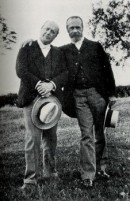Lisa Levy is a writer in Brooklyn, New York. Her book on modernism and biography, We Are All Modern, is forthcoming from FSG.
 Three incidents serve to illustrate the contentious nature of Henry James’ relationship with his older brother William.
Three incidents serve to illustrate the contentious nature of Henry James’ relationship with his older brother William.
Both were members of the National Institute of Arts and Letters, which established the Academy of Arts and Letters in 1905. Fifty initial members were chosen by ballot. Henry was chosen in the second ballot, William in the fourth. When William found out, he declined to join, citing several reasons but most crucially writing the Academy’s secretary, “I am the more encouraged to this course by the fact that my younger and shallower and vainer brother is already in the Academy and that if I were there too, the other families represented might think the James influence too rank and strong.” Henry knew nothing about this.
The second incident concerned William’s critique of Henry’s 1904 novel The Golden Bowl, which Henry considered his finest work. William pleaded with his brother to write a book “with no twilight or mustiness in the plot.” Henry, long used to his brother’s complaints about his indirect style, replied that he would be “humiliated to write such a thing that you like it!!!” This bantering continued in The American Scene, Henry’s 1907 account of his travels, including a long visit with William’s family. William remarked that Henry was on the verge of becoming “a curiosity of literature.” Henry coolly inscribed a copy of the book, “To William James, his incoherent, admiring, affectionate Brother, Henry James, Lamb House, August 21st 1907.”
Incoherent, admiring, affectionate: these adjectives describe the brothers’ relationship in its milder form. It was also intense, cantankerous, rivalrous, and petty. William once said of the expatriate Henry, “He is really a native of the James Family, and has no other country.” The James family was a nation with a small, itinerant population: William (born 1842), Henry (1843), Garth Wilkinson (called Wilky, 1845), Robertson (called Bob, 1846) and Alice (1848). As children, the dominant William monopolized the attention of their mercurial philosopher father, Henry James, Sr., who frequently uprooted his family in a grand experiment to give his children a “sensuous education,” while the milder Henry was the favored child of their stern mother, Mary. As young men, the brothers seemed to trade off periods of invalidism (both suffered from bad backs and stomach ailments, and later in life, heart problems), as if one of them had to be the object of parental attention while the other exercised the free will that Henry Senior often preached but his children found difficult to practice. Henry Senior was so intent on his boys being that both had trouble figuring out what they ought to be doing until well into their 20s; the elder boys, that is—the younger ones were sent to fight in the Civil War and make their own way in the world.
Maybe all sons of rich fathers without the cushion of wealth themselves suffer from such problems establishing themselves, and in William and Henry James we just see a version of those problems with a certain metaphysical bent. If, as Rebecca West famously wrote in her study of Henry James, one boy grew up to write philosophy as if it were fiction and the other to write fiction as if it were philosophy, then the brothers have more in common than William’s petulance and Henry’s gentle mocking in the incidents described above. There are general and specific moments of shared values in their work, as in William’s experiments in psychology and Henry’s development of the free indirect discourse technique, which delves into the consciousness of his characters. Henry’s biographer Leon Edel points out the thematic conjunction of William’s Varieties of Religious Experience (1902) and Henry’s “The Beast in the Jungle” (1903): both deal with finding one’s place in the world, and the ways in which people use one another. What Edel does not say is how utterly Jamesian these ideas are—they are all over the brothers’ writing, from Henry’s The Portrait of a Lady (1881) to William’s Pragmatism (1907). The obsession with finding one’s place in the world was the legacy Henry Senior left his sons. How people use one another fascinated both of them, but they responded in different ways. In his personal life, William tried to rise above it, though it is key to pragmatism. Henry, however, knew it was a necessary part of life, and could be benign or malicious: he was a compulsively social man, and wrote with unmatched nuance about the connections between people, about friendships, love affairs, parents and children, even siblings.
In 1916 during his final illness, Henry told his favorite niece, William’s daughter, Peggy, several times: “I should so like to have William with me.”

